罗马希腊文学
第一章 古希腊罗马文学概论

12件大功
赫拉派蛇去害赫拉克勒 斯,被他扼死在摇篮里,从 小出名。他的名字意思是 “通过赫拉扬名的人”。 他的12件任务第一件就 是杀死尼米亚狮,他将狮皮 剥下穿在身上。战胜九头蛇 是他的任务之一。
蒙特威尔第歌剧《奥菲欧》(1607)
蒙特威尔第是意大 利作曲家,现代歌剧的 奠基人,他创作的《奥 菲欧》被认为是歌剧史 上第一部成熟的歌剧作 品。奥菲欧是希腊神话 中的诗人和歌手,他的 新婚妻子尤丽迪茜被蛇 咬死,奥菲欧悲痛欲绝, 到冥府寻找爱妻。他在 冥河畔的独唱“我的心 离开了我”,成为歌咏 爱情的名曲。
安提戈涅和克瑞翁
斯特拉文斯基歌剧《俄狄浦斯》
悲剧继承了荷马史 诗的倒叙式结构,故事 从临近结尾的高潮处写 起,把追查凶手作为全 剧的起爆点,强化了西 方文学从高潮处写起的 叙事传统。国舅克瑞翁 带回神的预言,明确要 寻找凶手,形成戏剧的 第一个重要场面。
点击图片 播放视频
结局:自我脱冕
俄狄浦斯由两个演员 扮演,演唱者演唱,舞者 不说话。在结尾时,两个 俄狄浦斯融为一体。它表 现了俄狄浦斯自我脱冕, 自我惩罚,从一个戴着面 具,脸上涂着油彩的古代 国王蜕变为卸掉戏装面具 的现代普通人。表现了人 与命运斗争的自由意志, 也包含现代人的精神。显 示了歌剧改编的意义。
宙斯是众神之 王,他与姐姐赫拉 结合。他贪图男欢 女爱,天上人间都 有他的私生儿女。 他们形成了俄林波 斯神系的成员和半 人半神英雄。
宙斯与赫拉
众神之王——宙斯
天后——赫拉
宙斯的情人伊俄
返回
波塞冬
海神波塞冬通过与 海洋女神的女儿安菲特 利特结合而成为海神。 他喜欢马,将几匹马变 成长了鱼鳍的鱼马,在 水里也能为他驾车。
外国文学史 古希腊罗马文学

(三)欧里庇得斯-- “舞台上的哲学家”
主要作品: 《美狄亚》 《特洛亚妇女》 《希波吕托斯》
4.三大悲剧诗人比较
人物 命运 观 埃斯库罗斯 神 肯定 索福克勒斯 英雄 怀疑 欧里庇得斯 人 否定 诗人 美学风格 艺术 演员
庄严豪放 三联剧 1+1 严峻高雅 突破三 2+1 联剧 通俗细腻 单独的 无限 剧本
(二)黄金时期 (公元前100一公元17年)
贺拉斯,古罗马诗人。 著有《歌集》和《诗艺》。
“寓教于乐”
维吉尔《牧歌》中描述的田园景色 维吉尔 欧洲第一部文人史诗 《埃涅阿斯纪》
奥维德,古罗马诗人,著有《变形记》。
(三)白银时期(公元17—130年)
阿普列尤斯《金驴记》 被看作是最早的长篇小说。
希腊喜剧
1.喜剧的起源
喜剧也起源于酒神的仪式。 它是由秋季收获葡萄的时 候谢神的狂欢歌舞发展而成。 喜剧一词,来自希腊的 “Komos”, 就是狂欢者 的意思。
2.旧喜剧是公元前5世纪在 雅典上演的喜剧作品。 新喜剧的代表作家米南德。
3.代表作家
阿里斯托芬--喜剧之父 代表作《阿卡奈人》《鸟》
母狼与孪生子
二、古罗马影响文学因素
(一)罗马的社会发展 (二)罗马的奴隶制度 (三)罗马小农经济 (四)罗马的政治和文化
罗马圆形剧场
罗马军团大战蛮族(浮雕)
罗马奴隶生活
战争场面
三、古罗马文学的发展
(一)共和时期(公元前240一前30年)
普劳图斯《一坛黄金》,《孪生兄弟》 泰伦斯《婆母》、《两兄弟》
第一章 古希腊罗马文学
古希腊悲剧
古希腊露天剧场遗址
1.古希腊悲剧的起源
古希腊悲剧起源于民间 酒神祭祀的歌舞。 希腊“悲剧”一词的意 思就是“山羊之歌”。
西方文化第一章 古希腊古罗马文学
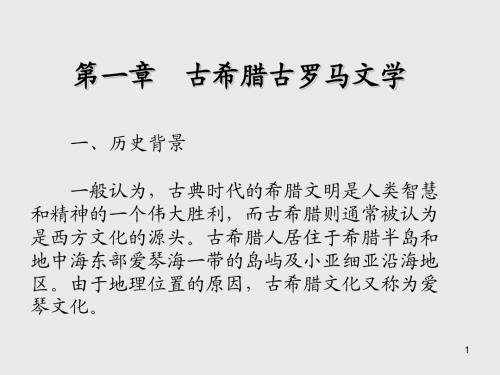
2
(一)神话、荷马史诗、抒情诗 希腊神话是古代希腊关于神的故事和英雄传说 的总和。希腊神话及荷马史诗是希腊人由野蛮时代 进入文明时代的主要遗产,凝聚着人类早期文明的 精髓。希腊神话内容丰赡、富于艺术表现力,是古 代希腊人探寻世界企图对周围世界作出自己的解释 的结晶,同时希腊神话与宗教有着密不可分的关系 。希腊人想象中的神与人一样,有着人的喜怒哀乐 、七情六欲,同时兼具人的一些性格缺点如嫉妒等 ,而希腊神话中的“不和的金苹果”“阿基琉斯的 脚踵”“达乃依的水桶”“金羊毛”等已经渗透到 后世生活当中成为人们的口头语。 3
四、原典选读 伊利亚特(第20卷) 这样的,那些阿开俄斯人在鸟嘴船旁边围绕着 那战斗不倦的、珀里斯之子布起阵来,那边的特洛 亚人也在平原的高地上布阵。同时宙斯从那崎岖的 俄林波斯顶,命令忒弥斯去召集群神来开会,她就 向各处跑了一匝,号召群神齐集在他的宫廷。除开 了长河,没有一道河道不到会,还有那些住在快乐 树林里和所有河流的源脉、所有多草的泽地里的女 神也没有一个不到。大家都来到了那行云之神的宫 殿里,在那大匠神赫淮斯托斯给父亲宙斯建造的大 理石走廊里坐下了。 6
(二)悲剧、喜剧、散文 希腊悲剧是从祭祀祈祷和赞美酒神的活动中发 展而来的。悲剧(Tragoidia)一词原意 是“山羊之歌”,古希腊每年在春冬时举行酒神祭 祀,参与祭祀者穿上羊皮毛,模拟酒神的从者是半 人半羊的神叫做萨提洛斯,举行祭仪时由披着山羊 皮的合唱队歌唱“酒神颂”,后来合唱队中增加了 一个演员,跟合唱队对答歌词。这就形成了戏剧表 演中对白的基础,早在公元前6世纪已经创作了最 早的悲剧。在爱奥尼亚起义时代,佛律尼科斯的悲 剧《米利都的陷落》使观众潸然泪下。
那克洛诺斯之子的这几句话放纵了一群战争的 狗。那些不死之神立刻就分成两个敌对的集团,动 身前往那行动的场面了。赫拉和帕拉斯· 雅典娜向 阿开俄斯人的舰队进发。还有那绕地之神波塞冬, 那幸运的赍送者和最奇妙的奇迹制造者赫耳墨斯, 也都往那一边去。赫淮斯托斯也跟在他们后边,得 意洋洋的觉得自己的力气大得很,因为他虽然是个 瘸子,他那两条细腿是活泼得很的。向特洛亚人方 面走的,有戴着闪亮头盔的阿瑞斯、披着头发的福 玻斯、女射神阿耳忒弥斯、勒托、克珊托斯河神, 以及爱欢笑的阿佛洛狄忒。
古希腊罗马文学作品
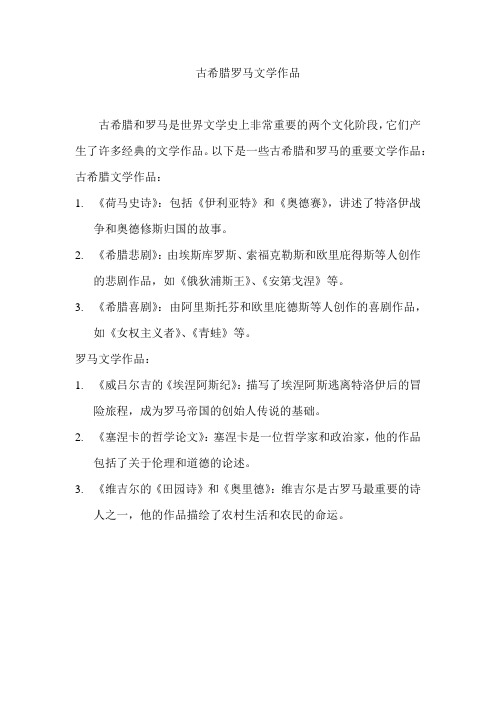
古希腊罗马文学作品
古希腊和罗马是世界文学史上非常重要的两个文化阶段,它们产生了许多经典的文学作品。
以下是一些古希腊和罗马的重要文学作品:古希腊文学作品:
1.《荷马史诗》:包括《伊利亚特》和《奥德赛》,讲述了特洛伊战
争和奥德修斯归国的故事。
2.《希腊悲剧》:由埃斯库罗斯、索福克勒斯和欧里庇得斯等人创作
的悲剧作品,如《俄狄浦斯王》、《安第戈涅》等。
3.《希腊喜剧》:由阿里斯托芬和欧里庇德斯等人创作的喜剧作品,
如《女权主义者》、《青蛙》等。
罗马文学作品:
1.《威吕尔吉的《埃涅阿斯纪》:描写了埃涅阿斯逃离特洛伊后的冒
险旅程,成为罗马帝国的创始人传说的基础。
2.《塞涅卡的哲学论文》:塞涅卡是一位哲学家和政治家,他的作品
包括了关于伦理和道德的论述。
3.《维吉尔的《田园诗》和《奥里德》:维吉尔是古罗马最重要的诗
人之一,他的作品描绘了农村生活和农民的命运。
古希腊罗马文学
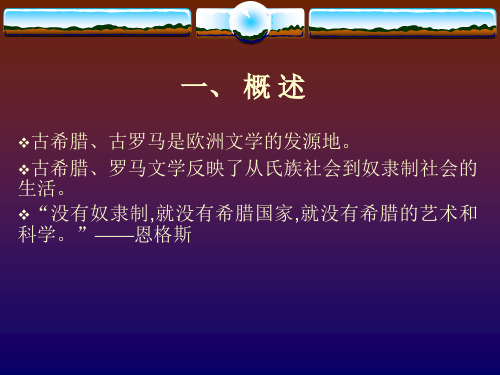
(1)关于伊索:伊索确有其人,是个奴隶,也 是个演说家; (2)《伊索寓言》的形成:民间口头创作集 成,伊索是最早的搜集者; (3)性质:一部世界寓言名著,是以希腊 人为主的多民族文化的产物; (4)内容:揭示压迫者和被压迫者的真实 关系,反映希腊奴隶阶级的思想和愿望;总结生 活经验和处世哲学。
(2)英雄传说: 源于希腊人对祖先的崇拜和追忆。 赫拉克勒斯的十二大功业;伊阿宋取金羊 毛;俄底浦斯的故事;阿尔戈的英雄等。
4、古希腊神话的特点:
吉尔伯特〃穆莱在《希腊宗教的五个阶段》指出: “大多数民族的神都自命曾经创造过世界,奥林匹克的神 并不自命如此。他们所做的,主要是征服世界。他们都是 些嗜好征服的首领,是些海盗之王。他们既打仗又豪饮, 又游玩又作乐,他们只怕自己的王,从来不知惧怕别的。 除了在恋爱和战争中外,他们从来不说谎。”——快乐的 神、英雄的神、人间的神。正常儿童的乐观想象。 (1)人本主义与命运观念并存:相信命运的轮回,又 充分尊重人的个性意志与自由。 (2)神人同形同性,神其实是人的观念的具像和外化, 神就是人,神话就是人话。神人同形同性;
1、抒情诗:
(1)形成与繁荣: 私有制的出现;个人意识的滋长;社会分 工使专门从事精神生产成为可能; (2)种类: 笛歌、琴歌、讽刺诗;
(3)女诗人萨福的创作:
萨福(公元前612—?),被柏拉图称为“第十位文艺女神”。 “漫不经心的人声称缪斯只有九 个,须知雷斯博斯的萨福是第十位 文艺女神。”——柏拉图 据传写有九卷诗,但流传下来 的完整的诗篇很少。 其诗感情真挚,语言朴素,大 多为恋爱之歌。 《给所爱》、《一个少女》是完 整的两首。
什么是比拟类推:奥地利心理学家容格 认为:原始人并不是在发明神话,而是体验 神话。人神互渗。他们“从单纯的共在关系中 直接发现因果关系”(斯特劳斯《野性的思维 》)。自己睡眠中做梦,灵魂出窍。既而从 自己开始比拟类推,万物有灵。
西方文学十五讲第二讲古希腊罗马文学
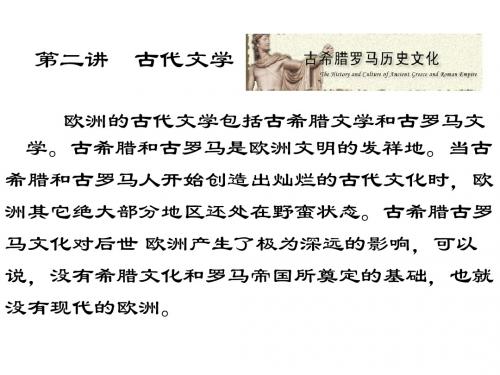
雅典法庭
雅典大学堂
民主选票
掷 铁 饼 者
学习
谈论哲学
朗诵荷马史诗
演讲
戏剧演出
婚宴
歌舞
古希腊的妇女
民族性格:自由奔放、富于想 像、充满原始情欲、崇尚智慧 和力量。
3)性格特征
价值观念:追求现世生命 价值、注重个人地位和个 人尊严。
2、外部影响 1)、对外交流广泛 古希腊海湾、海岛众多,航海业发达,因此,同 其它地区,特别是同埃及和西亚各国有着广泛的商 业、文化联系。 2)、东方文明的影响 希腊文明诞生之前,亚洲西部的两河流域就不断 产生了苏美尔文明、巴比伦文明和亚述文明。北非 的埃及在工业、农业、科学、文学艺术等方面也出 现了罕见的奇迹。 这一切都对希腊文化产生了深刻影响。
托罗斯神殿
2、史诗:古希腊文学的最高成就 代表作品:《伊利亚特》(《伊利昂纪》) 《奥德修纪》(《奥德赛》) 作者:盲眼行吟诗人—荷马(约前9-8世纪) 《伊利亚特》赏析 结构:分为24卷,共有15000多行。 题材:取自古代特洛伊战争的传说。 梗概:(略) 人物:阿喀琉斯、赫克托耳 起因:不和的金苹果 主线:阿喀琉斯的愤怒
三、希腊文学的分期
1、荷马时代 (公元前12世纪到公元前8世纪) 2、奴隶制城邦形成和繁荣时期 (公元前8世纪到公元前6世纪 ) 3、古典时期 (公元前6世纪到公元前4世纪) 4、希腊化时期 (公元前3世纪-----公元146年)
荷马时代
(前11世纪—前9世纪) 氏族公社向奴隶社会过渡 时期; 文学成就:神话、史诗
2、黄金时期(前100-公元17年)
从公元前1世纪至公元1世纪,特别是渥大维 获得“奥古斯都”(神圣、崇高之义)称号的执 政期间,是罗马文学的黄金时期。渥大维大力 提倡文学创作,促进了具有独立民族风格的罗 马文学正式形成。西塞罗(公元前106-公元 前43)的演说辞,是优美的古典散文;卢克莱 修(约公元前98-公元前55)的《物性论》, 是著名的长篇哲理诗。这一时期罗马文学最大 的成就,是涌现出享有世界声誉的维吉尔、贺 拉斯和奥维德三大诗人。
第一章古希腊罗马文学

第一章古代希腊罗马文学概论欧洲古代文学包括古希腊文学和罗马文学。
古代希腊文学是欧洲文学的源头。
古希腊、罗马文学是西方文明的摇篮,是世界文明的发源地。
第一节古希腊文学古希腊文学是欧洲文学史上最早的文学,是原始社会向奴隶社会过渡的文学,是这种社会状况的反映。
古希腊文学还为欧洲和世界文学树立了文学原型。
两个永恒的主题:power,love。
在叙事形式上创立了许多的形式,为世界叙事形式树立了原型。
Epic,myth。
古希腊文学的发展过程(一)第一阶段:公元前十二世纪——公元前八世纪,这一时期,古希腊由原始社会向奴隶制社会过渡,出现最早的希腊文学,被称为“荷马时代”。
主要文学成就是神话和荷马史诗。
(二)第二阶段:公元前8世纪——公元前6世纪。
这一期间出现了各种创作,但影响不大,成就不高。
主要文学形式是抒情诗。
代表人有:萨福、品达等。
赫希俄德的《神谱》属于叙事诗。
抒情诗主要歌颂爱情。
(三)第三阶段:公元前5世纪——公元前4世纪。
被称为古典时期。
这是希腊奴隶制全盛时期,也是古希腊文学史上的黄金时代,成就最高,主要是古希腊的戏剧、文学理论。
(柏拉图、亚里士多德)(四)第四阶段:公元前四世纪之后,奴隶制国家衰落,被称为希腊化时期,主要文学形式是新喜剧,代表人物有:米南德、阿里斯多芬等。
文学崇尚修辞技巧,内容贫乏。
一、古希腊神话(一)、希腊神话的内容主要包括神的故事、英雄的故事。
1神的故事(1)前奥林匹斯神系:宙斯在奥林匹斯山上建立神族以前的神的故事。
突出的特点:人吃人:女人起很关键的作用:乱伦。
主题:反映了原始社会早期的母权社会的社会状况。
地母盖亚→乌拉诺斯(第一代天神)地母盖亚和第一代天神乌拉诺斯→克罗诺斯(第二代天神)第二代天神克罗诺斯和瑞亚→宙斯(2)奥林匹斯神系:反映了原始社会后期父权社会的社会状况。
神的故事就是开天辟地、神的诞生、神的宗谱、神的活动、人类的起源性都属于神的故事。
2英雄的故事(1)特点:希腊神话中的英雄比较独特,一般都是神和人结合产生的。
1、古希腊罗马文学

五、古希腊神话对后世的影响 古希腊神话为后世作家提供了创 造素材和创作灵感 古希腊神话对后世欧洲艺术也有 影响
古希腊神话给西方的语言增加了 词汇和典故
六、总评 马克思:“它(古希腊神话)是历 史上人类童年时代的产物,它们作为 ‘永不复返的阶段’而显示出永久的 魅力。” “一个成人不能再变成儿童,否则 就变得稚气了,但是儿童的天真不使 人感到愉快吗?”
第一章 古希腊罗马文学
上古文学
概念:指我国文学之外,世界上最早的文学,
即原始社会和奴隶社会的文学。(公元前40 世纪——公元5世纪)
内容:原始公社时代和奴隶制时代的社会现实。 特征:自发的现实主义和浪漫主义相结合的创
作方法,但以浪漫主义为主。
发展状况:
1、古希腊、罗马:神话、史诗、戏剧、文艺理论
奥德修斯与“木马计”
2、思想内容
(1)广泛地反映了以战争为中心的荷马时 代的社会生活。 (2)反映了古希腊人“人神混合”、“人 神不分”的观念。
(3)反映了古希腊社会人们对英雄的崇敬。
3、人物形象
(1)阿喀琉斯
他是一个带有阶级色彩的氏族贵族典型。
一方面,他英勇善战,不怕牺牲,极端 重视个人尊严和荣誉。 另一方面,暴烈、任性,而又重友情, 富有同情心。
(2)寓言故事 :《伊索寓言》
A、表现了当时的阶级对立关系:《狼和小羊》 B、总结了古代人们的斗争经验和生活教训: 《农夫和蛇》,《龟兔赛跑》,《乌鸦和狐狸》
C、反映了被压迫者安于现状、消极忍让和宿命 论思想:《公牛与蛤蟆》
特点:短小精悍,语言简练,形象生动,寓 意深刻。
(3)戏剧(专节讲) 古希腊戏剧的发展得到了统治者的 重视,出现了三大悲剧家和一位喜剧家。 (4)文艺理论 戏剧的繁荣带来了文艺理论的兴盛, 出现了两位文艺理论家。
外国文学史古希腊罗马文学梳理

读书摘引外国文学史北京师范大学出版社匡兴主编第一章古希腊罗马文学第一节概述希腊文学从远古时代到公元前二世纪可分为四个时期。
一、公元前12—前8世纪“神话和史诗的繁荣”这是古希腊氏族公社瓦解、过渡到奴隶制的时期,被称为“荷马时代”、“英雄时代”。
是神话和史诗繁荣时期。
古希腊神话可以分为神的故事、英雄传说两部分。
希腊神话基本特点是人神同形同性。
而英雄传说则是部落集体力量和智慧的化身。
诗歌方面,荷马史诗、赫西奥德的【工作与时日】是其代表作品。
二、公元前8—公元前6世纪抒情诗的时代城邦制建立带来了个人独立地位的追求之中所产生的个人的体验和感受。
集体意识的史诗衰落,抒情诗逐渐兴起。
抒情诗按演奏乐器分为双管歌和琴歌,双管歌又称哀歌,包括挽歌、战战、情歌。
琴歌分为独唱【又分为爱情诗和饮酒诗】,合唱。
古希腊最著名的女诗人萨福,被称为“第十位文艺女神”。
在此期间伊索寓言也很流行,不过有研究认为有些语言来自埃塞俄比亚。
三、前6—前4世纪戏剧全盛该期史称“古典时代”,囊括了雅典的全盛和衰败。
戏剧的文学成就最高。
“历史之父”希罗多德、修昔底德、色诺芬等著名历史学家也很出色。
四、前4—前2世纪衰落的“希腊化时代”希腊成为马其顿的一部分。
文学成就不大,集中在新喜剧【以亚历山大城的忒俄克里托斯】和田园诗【以米南德为代表】上。
第二节荷马史诗盲诗人荷马创作的史诗包括【伊利昂纪】、【奥德修纪】,都与特洛伊战争有关。
特洛伊战争是一次部落战争,也是一场关于谁美的争执引发的战争。
形象和思想:英雄主义集体主义的英雄形象的塑造;热爱生活、积极乐观;重视现实的幸福;奴隶主观点明显,贵族化倾向。
艺术特点:1、剪裁巧妙,结构完整;2、主干与插曲相结合;3、人物形象塑造手法高超;4、仅仅客观叙述;5、诗句动听优美、丰富想象出色的比喻和韵律;6、口头艺术,重复手法多次使用。
第三节希腊戏剧古希腊戏剧起源于酒神祭典。
城邦鼓励戏剧发展,促进了文化多方面繁荣。
西方文学两大文学源头名词解释

西方文学两大文学源头名词解释
西方文学的两大文学源头分别指的是古希腊文学和古罗马文学。
这两个文学源头对西方文学产生了深远的影响,塑造了西方文学的
传统和发展方向。
古希腊文学是指起源于古希腊的文学作品,包括史诗、戏剧、
哲学和诗歌等多种文学形式。
古希腊文学的代表作品包括荷马的史
诗《伊里亚特》和《奥德赛》,以及古希腊悲剧和喜剧等戏剧作品。
古希腊文学强调人的悲剧命运和道德选择,对后世文学产生了深远
的影响,成为西方文学的重要源头之一。
古罗马文学则是指古罗马时期的文学作品,受到古希腊文学的
影响,但也有自己独特的特点。
古罗马文学的代表作品包括维吉尔
的史诗《埃涅阿斯纪》,奥维德的史诗《变形记》,以及塞涅卡的
哲学作品等。
古罗马文学在史诗、哲学和散文方面都有重要的成就,对欧洲文学的发展产生了深远的影响。
这两大文学源头共同构成了西方文学的基石,对后世文学产生
了深远的影响。
古希腊文学强调人的悲剧命运和道德选择,而古罗
马文学则在史诗、哲学和散文方面有着重要的成就。
这两个文学源
头的作品和思想为西方文学的发展奠定了坚实的基础,成为后世文学创作的重要参照和借鉴对象。
古希腊罗马文学

③欧里庇得斯 代表作是《美狄亚》. 伊阿宋 美狄亚是一个热情,坚强,富有反抗 性的女性.其悲剧具有深刻的社会 意义.
三,古希腊喜剧作家 古希腊喜剧较悲剧晚,一般称 为“旧喜剧”,主要是政治讽刺剧 和社会讽刺剧. 代表作家是阿里斯托芬 《阿卡奈人》和《鸟》.
2.希腊悲剧的重要作家及作品 公元前5世纪是希腊悲剧的繁 荣时期,出现了史称三大悲剧诗人 埃斯库罗斯,索福克勒斯和欧里庇 得斯.
①埃斯库里斯 《被缚的普罗米修斯》取材于希腊 神话.悲剧主要描写普罗米修斯与 宙斯之间的矛盾斗争,歌颂了为人 类进步和正义事业不惜一切的崇高 精神.
宙斯 普罗米修斯
《奥瑞斯忒亚》也取材于希腊神话. 揭示了父权制对母权制的胜利,表 现了具有民主精神的法律裁判代替 了家庭仇杀.
阿伽门农 克侣泰墨斯特拉 俄瑞斯忒斯
埃吉斯托斯
②索福克勒斯 “戏剧艺术中的荷 马” 《俄狄浦斯王》. 悲剧着力表现的是个人意志与不可 抗拒的命运的冲突.
太阳神阿波罗 忒拜国王拉伊俄斯 科林索斯国
欧洲古代文学
古希腊罗马文学
古代欧洲文学专指古希腊和古罗马 文学.古希腊和古罗马是欧洲文化 的发祥地.古希腊,罗马文学反映了 从氏族社会到奴隶制社会的生活, 并成为欧洲文学的源头.
第一节 古希腊文学概述
1.古希腊的地理位置与历史文化
2.古希腊文学发展概况 古希腊文学大致可分为四个时期. ①从公元前11世纪到公元前9世纪 史称"荷马时代"或"英雄时代". 文学的主要成就是神话传说和荷马 史诗.
古代希腊戏剧分为悲剧和喜剧,它 产生的古典时期雅典奴隶主民主 政治和文化繁荣的背景下,是古希 腊文学最辉煌的成就之一.
外国文学史 古希腊罗马
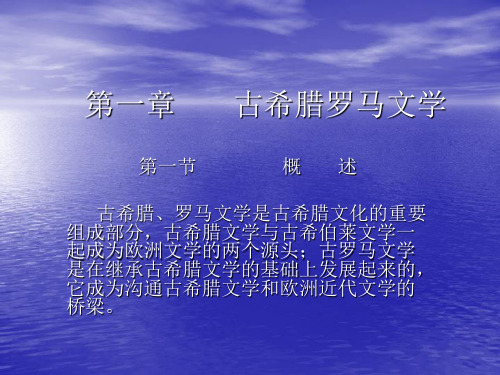
1、具体地反映了古希腊由氏族制向奴隶制 过渡时期的社会情况: 社会的基本结构为氏族;部落实行军事民 主制;最高权力机构为民众大会、长老会; 出现氏族贵族。 社会处在第一、二次大分工之间,农牧业 发达;劳动工具多为铜制品;物物交换, 牛为尺度;出现家奴。 社会向父权制发展过渡,一夫一妻制确立; 妇女贞操观确立;妇女地位低下。
3、公元前6世纪末——公元前4世纪初 (希腊奴隶主民主制度发展的鼎盛时期,史称古典时 期) (1)散文: 古希腊的散文主要是一些哲学、历史著作和演说辞, 最出名的哲学家和演说家有苏格拉底、柏拉图和亚 里士多德。柏拉图和亚里士多德的文艺理论奠定了 欧洲文艺理论的基础。 柏拉图(前427一前345)的主要理论著作是《理想 国》,他的文艺理论的核心是“理念论”。 亚里士多德是柏拉图的弟子,他继承了柏拉图的摹 仿说。他的文艺理论奠定了欧洲现实主义文学理论 的基础。主要著作是《诗学》,在理论上总结了希 腊文学的创作经验,着重分析了悲剧。
• 提图斯· 玛求斯普劳图斯 ——喜剧的内容大部分
•
ห้องสมุดไป่ตู้
是利用滑稽可笑的情节揭露和讽刺上层人物贪婪、 腐败、道德败坏的恶习,同情敢于争取婚姻自由 的男女青年和没有自由的奴隶,有一定的民主倾 向,语言生动活泼,情节生动形象,动作性强。 著名的作品有《孪生兄弟》、《吹牛的军人》、 《一坛黄金》等。 塞内加是罗马最重要的悲剧家。他的作品都是古 希腊的悲剧为名,揭露暴君和专制,悲剧英雄都 是注定要毁的坚强人物,具有紧张、恐怖、痛苦 的风格,有别于古希腊悲剧严肃、悲壮、高的风 格。
贺拉斯——奥古斯都时期杰出的抒情诗人、讽
刺诗人和文艺评论家。《歌集》是他的抒情诗的 代表作,歌颂了友谊、爱情和美好的品德。《诗 艺》,是他的文艺批评的代表作。在文艺与现实 的关系问题上,贺拉斯继承了亚里士多德的摹仿 说,明确地提出了“寓教于乐”的原则,要求文 学作品必须具有“统一和谐调的美”,这一主张 对后来的古典主义文艺理论产生了很大的影响。 奥维德——奥古斯都时代第三位重要的诗人。 主要作品是长篇叙事诗《变形记》。全诗包括250 个古希腊、罗马的神话故事,它以时间为顺序, 从宇宙开天辟地一直写到罗马的奥古斯都时代, 将神话、传说、历史故事融合在一起,形象生动, 想象丰富,诗句新颖,后世的欧洲作家都喜欢从 这部作品中选择题材。
第一章古希腊古罗马文学

阿尔玛《萨福和阿尔凯奥斯》
萨福对后世西方作家有很大影响。拜伦到希腊游 历,凭吊萨福。画家也以她为题材进行创作。法国画 家阿尔玛的作品《萨福和阿尔凯奥斯》(1881),乐 师正在为萨福弹竖琴,激起诗人创作的想象。
《伊索寓言》
和抒情诗同时兴起的另一文学体裁是散文体 的动物寓言,相传由公元前6 世纪的奴隶伊索所 作,实际上是希腊人民民间口头创作的结晶。现 在流传的《伊索寓言》是后人根据拜占廷僧侣普 拉努德斯搜集的寓言及以后陆续发现的古希腊寓 言抄本编订的,有些故事还可能来自亚洲、非洲, 所收篇目约300余篇。
第一章 古希腊古罗马文学
第一节 概 述
一、古希腊文学产生的文化条件
(一)天时地利人和 1、气候 2、地理条件 3、人口
(二)文化条件:克里特—迈锡尼文化
大约在公元前3000年至 2000年间,爱琴海上的克里 特岛和伯罗奔尼撒半岛上的 迈锡尼等地的奴隶制经济得 到发展,产生了克里特—迈 锡尼文化(也被称为爱琴文 化)。克里特文化的主要遗 迹就是著名的诺萨斯王宫 (后被希腊人当做神话中的 “迷宫”);迈锡尼文化的 一个重大创造是发明了自己 的文字。古希腊文学就是在 它的基础上直接发展起来。
这是奴隶制社会形成的时期,文学成就包括抒 情诗、散文、寓言。
抒情诗源于民歌,多以双管、排箫和竖琴伴唱, 主要体裁有哀歌、讽刺诗和琴歌,反映上层贵族的 情趣。
抒情诗人:萨福
女诗人萨福(公元前 610—?)以写作爱情抒情诗为 主,她的诗歌感情真挚热烈, 语言朴素自然。她的诗体被后 世诗人模仿,称为“萨福体”。
奥林匹亚小镇、遗址
古代奥运会遗址是奥林匹亚,它是一个 小镇。每个商店的商品都是体育用品。显示 出希腊人热爱体育的精神。
奥林匹亚遗址保存着古希腊人的竞技场。 宙斯神庙是奥林匹亚最大的建筑。现代奥运 会的圣火用这里的橄榄枝点燃。现代奥运会 的创始人是法国教育家皮埃尔·德·顾拜旦, 他使中断了1600年的奥运会得以恢复,复兴 了奥林匹克精神。
欧洲古代文学包括古希腊文学和古罗马文学
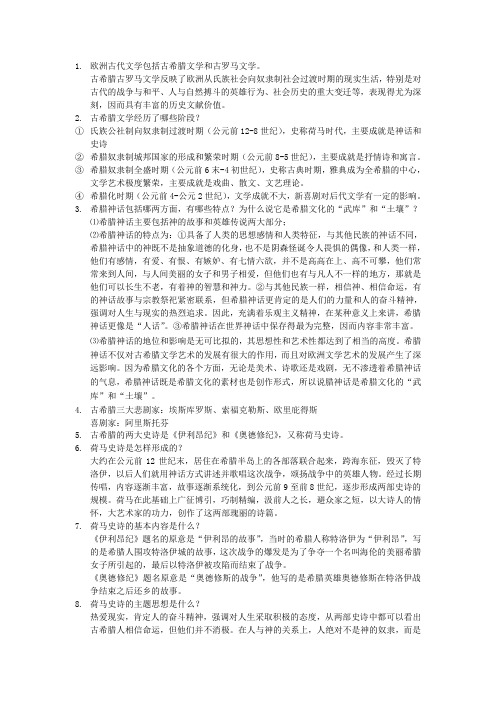
1.欧洲古代文学包括古希腊文学和古罗马文学。
古希腊古罗马文学反映了欧洲从氏族社会向奴隶制社会过渡时期的现实生活,特别是对古代的战争与和平、人与自然搏斗的英雄行为、社会历史的重大变迁等,表现得尤为深刻,因而具有丰富的历史文献价值。
2.古希腊文学经历了哪些阶段?①氏族公社制向奴隶制过渡时期(公元前12-8世纪),史称荷马时代,主要成就是神话和史诗②希腊奴隶制城邦国家的形成和繁荣时期(公元前8-5世纪),主要成就是抒情诗和寓言。
③希腊奴隶制全盛时期(公元前6末-4初世纪),史称古典时期,雅典成为全希腊的中心,文学艺术极度繁荣,主要成就是戏曲、散文、文艺理论。
④希腊化时期(公元前4-公元2世纪),文学成就不大,新喜剧对后代文学有一定的影响。
3.希腊神话包括哪两方面,有哪些特点?为什么说它是希腊文化的“武库”和“土壤”?⑴希腊神话主要包括神的故事和英雄传说两大部分;⑵希腊神话的特点为:①具备了人类的思想感情和人类特征,与其他民族的神话不同,希腊神话中的神既不是抽象道德的化身,也不是阴森怪诞令人畏惧的偶像,和人类一样,他们有感情,有爱、有恨、有嫉妒、有七情六欲,并不是高高在上、高不可攀,他们常常来到人间,与人间美丽的女子和男子相爱,但他们也有与凡人不一样的地方,那就是他们可以长生不老,有着神的智慧和神力。
②与其他民族一样,相信神、相信命运,有的神话故事与宗教祭祀紧密联系,但希腊神话更肯定的是人们的力量和人的奋斗精神,强调对人生与现实的热烈追求。
因此,充满着乐观主义精神,在某种意义上来讲,希腊神话更像是“人话”。
③希腊神话在世界神话中保存得最为完整,因而内容非常丰富。
⑶希腊神话的地位和影响是无可比拟的,其思想性和艺术性都达到了相当的高度。
希腊神话不仅对古希腊文学艺术的发展有很大的作用,而且对欧洲文学艺术的发展产生了深远影响。
因为希腊文化的各个方面,无论是美术、诗歌还是戏剧,无不渗透着希腊神话的气息,希腊神话既是希腊文化的素材也是创作形式,所以说腊神话是希腊文化的“武库”和“土壤”。
古代希腊罗马文学讲解
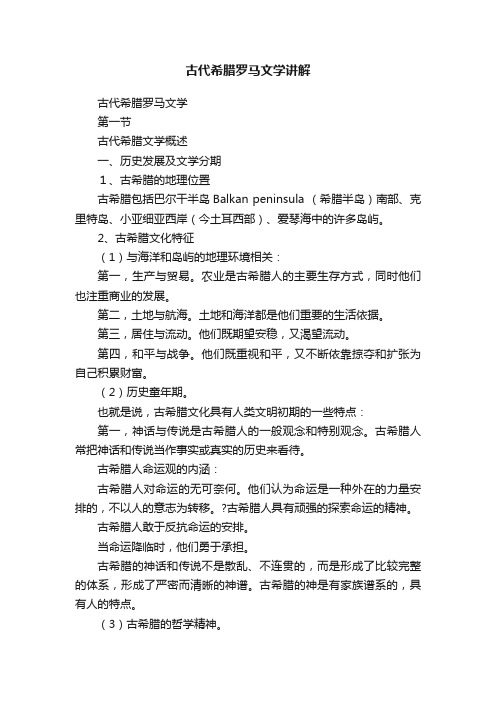
古代希腊罗马文学讲解古代希腊罗马文学第一节古代希腊文学概述一、历史发展及文学分期1、古希腊的地理位置古希腊包括巴尔干半岛Balkan peninsula (希腊半岛)南部、克里特岛、小亚细亚西岸(今土耳西部)、爱琴海中的许多岛屿。
2、古希腊文化特征(1)与海洋和岛屿的地理环境相关:第一,生产与贸易。
农业是古希腊人的主要生存方式,同时他们也注重商业的发展。
第二,土地与航海。
土地和海洋都是他们重要的生活依据。
第三,居住与流动。
他们既期望安稳,又渴望流动。
第四,和平与战争。
他们既重视和平,又不断依靠掠夺和扩张为自己积累财富。
(2)历史童年期。
也就是说,古希腊文化具有人类文明初期的一些特点:第一,神话与传说是古希腊人的一般观念和特别观念。
古希腊人常把神话和传说当作事实或真实的历史来看待。
古希腊人命运观的内涵:古希腊人对命运的无可奈何。
他们认为命运是一种外在的力量安排的,不以人的意志为转移。
?古希腊人具有顽强的探索命运的精神。
古希腊人敢于反抗命运的安排。
当命运降临时,他们勇于承担。
古希腊的神话和传说不是散乱、不连贯的,而是形成了比较完整的体系,形成了严密而清晰的神谱。
古希腊的神是有家族谱系的,具有人的特点。
(3)古希腊的哲学精神。
第一,各种学说的发达。
第二,思辨的理性能力。
古希腊哲学更具概念、推理等理性的特点,而不同于东方哲学侧重领悟、体验的方式。
第三,“逻各斯”。
“逻各斯”的内涵很丰富,主要指逻辑关系。
它不仅涉及对宇宙发展规律的原因的永恒探索,而且涉及对现实中的空间、时间以及自然界各种因果关系的追寻。
3、古希腊的历史发展古希腊文化的前身:称克里特-迈锡尼文明(Crete Mycenae Civilization )克里特文明,又称爱琴文明(Aegean Civilization):公元前2600-前1400年。
最早产生于克里特岛,因其处于欧亚非交汇点,故渐至繁荣。
新石器时代,小亚细亚人渡海至克里特,前3000年已进化至使用铜器和武器;前2000年进入青铜时代,出现了欧洲最早的奴隶制国家。
第一章古希腊罗马文学讲解
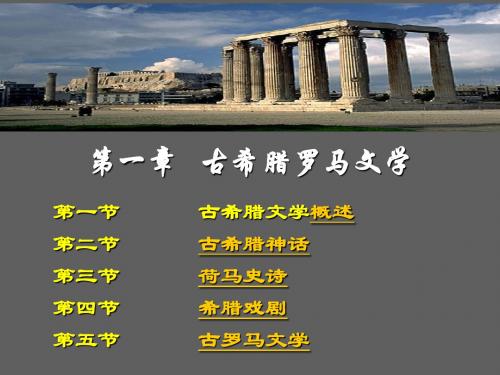
美狄亚的形象
是个热烈追求平等,带有原始特点的泼辣女 性形象。美狄亚聪明热情、敢作敢为。
美狄亚的反抗表明了她是一个勇敢的、聪明 倔强的同恶势力进行斗争的妇女中的英雄人物。 主要表现在她敢于报复:她不能忍受被遗弃,受 凌辱的遭遇。毒杀了公主和国王,对依仗权势欺 人者进行了报复;她又杀死了自己和伊阿宋的两 个孩子,对喜新厌旧、忘恩负义者进行了报复。 反抗精神达到了何等到强烈的程度
《俄瑞斯忒亚》 现存惟一一部完整的古希腊三部曲 阿特柔斯家族世仇
——父权制对母权制的胜利 《阿伽门农》特洛战争之后阿伽门
农被王后克吕墨斯特拉所杀 《奠酒人》王子俄瑞斯忒亚杀母为
父复仇 《报仇神》法庭审判王子无罪 35
埃斯库罗斯-悲剧之父
他把演员的数目由一个增至两个,并削减 了合唱队,使对话成为主要部分,这是由 集体的表演唱转变为戏剧的一个质的飞跃。
• 是一个富有道义感的悲剧英雄. • 是一个温情脉脉的具有现代人性意识
的古代英雄.
22
奥德修
• 《奥德修纪》中的主人公 • 足智多谋的政治家和领袖。英勇、
顽强、战斗不息、智慧过人的古代 英雄。
• 他与惊涛骇浪和妖魔鬼怪搏斗,也
巧用智谋,勇敢地战胜了无数次艰 险。鼓舞他战胜困难的是他对部落 集体和对妻子的深厚感情。
42
在悲剧表演方面,他把演员增加到三个。 舞台上演员人数的增加可以使戏剧情节 能沿着不同的线索发展可以用次要人物 来丰富剧情。在布局方面具有很高的技 巧。人物配置往往采用对照手法,相反 的性格互相衬托,这就显得格外鲜明。
戏剧结构复杂、严密而又自然,布局也 紧凑、完美。语言能引起联想,为观众 所理解,但剧中人物却不理解,这种手 法可以产生强烈的戏剧效果。对话明快, 紧凑、十分巧妙。
古希腊罗马文学概

文艺理论
• 在古希腊,文艺理论和美学是哲学的组成 部分,因此,当时杰出的文艺理论家和美 学家,也是著名的哲学家。文艺理论家的 代表是柏拉图(公元前427—347)和亚里 士多德(公元前384—322)
历史著作
• 雅典全盛时期,几次著名的战争使希腊出 现了正式的历史著作。从文学角度看,它 标志着散文的新发展。著名的历史著作是 “历史之父”希罗多德(公元前485—425) 的《历史》(《希腊波斯战争史》)、修 昔底德(公元前460—400)的《伯罗本尼 撒战争史)和色诺芬(公元前430—355) 的《长征记》。
寓言哲理
• 《伊索寓言》主要反映的是下层平民与奴 隶的思想感情和哲学观点。作者在保留寓 言中的动物本性特征的同时,赋予它们以 人的语言和思想,几乎每则寓言都要阐明 一种道理或观点,发人深省。 • 它的形式短小精悍,比喻生动恰当, 对后来的寓言作家拉封丹、克雷洛夫都产 生了很大影响。
3.第三阶段,公元前6——4世纪初
贺拉斯
• 贺拉斯(公元前65- 8)讽刺诗人,文艺论 文《诗简》,“寓教于乐”。
奥维德
• 奥维德(公元前43- 公元17)诗人,长诗 《变形记》,描写人变动物植物的故事。 它是最早的异化描写。 20世纪卡夫卡同 名小说《变形记》描写人变甲虫,借用了 奥维德的书名和变形模式,用它做现代阐 释。
古罗马文学的历史地位
古希腊罗马文学概述
一、古希腊文学的分期与成就
• 古希腊的历史从公元前12世纪到公元前2世 纪中叶希腊被罗马占领为止,经历了大约 1000年的时间。其文学分期,大致可以分 为四个阶段。 • 1.第一阶段,公元前12——8世纪 • 这是氏族社会向奴隶制社会过渡时期, 史称“荷马时代”或“英雄时代”,主要 的文学成就是神话和史诗。
古希腊罗马文学概述课件

阿里斯托芬(445B.C.-385B.C.)
旧喜剧诗人,喜剧之父 创作44出喜剧,现存11出. 《阿卡奈人》《骑士》《云 《马蜂》《和平》《鸟》 《吕西斯特拉特》《地母节 妇女》 《蛙》《财神》
反对战争,主张体面的妥协《阿卡奈人》 政治上倾向于保守,反对激进的举措 伦理观念上维护传统道德,反对智者说教 艺术创作上欣赏平稳的继承,讨厌过分的、效果 不好的创新 有非同寻常的想象力
合唱琴歌在斯巴达等地方比较发达。合唱琴歌往往与颂神活动、体育竞技等集体活 动相联系,描写社会政治,抒发集体思想和情感,较少抒发个人感情,合唱琴歌朗 诵时,往往载歌载舞。
写诗十七卷,有四卷流传下来 品达
合唱
奥林匹克运动会优胜者所写的那些颂歌,风格庄重华美
《伊索寓言》
包括三、四百个小故事,大部分是动物故事, 它是从智者的角度来看社会,采用拟人手法 借动物故事来反映人类的现实生活,总结人 类的斗争经验,具有浓郁的民间色彩。它总 结了下层人民的生活经验,反映了平民的思 想感情。
荷马史诗
古代希腊流传至今最早的文学作品是两部史 诗《伊利昂纪》(《伊利亚特》)和《奥德 修纪》(《奥德赛》),相传这两部史诗都 是盲诗人荷马所作,故这两部史诗合称为 “荷马史诗”。
三大悲剧作家比较
诗 人 生活年代 525B.C.456B.C. 生活时期 奴隶主民主 制国家形成 时期 特 点 代 表 作 作品数 量 贡 献 取材于神话 《被缚的 力求在人的 普罗米修 活动中寻求 斯》 神力的影响 取材于神话 人物是独立 《俄底浦 行动的。自 斯王》 己决定对人 对事的态度
埃斯库 罗斯
古典时期
悲剧与戏剧都起源于酒神祭祀。 戏剧代表着这时期希腊文学的最高成就,三大悲剧 诗人埃斯库罗斯、索福克勒斯、欧里庇得斯和喜剧 作家阿里斯托芬是这时期戏剧辉煌的标志 历史著作、哲学著作、演说辞在这时期也发展起来, 著名历史学家希罗多德、修昔底德、色诺芬的历史 著作有浓厚的文学色彩,是优美的散文。哲学家、 演说家苏格拉底和狄摩西尼对后来欧洲演说术影响 很大。
罗马和希腊的文学和历史

罗马和希腊的文学和历史转眼间,希腊罗马文学历史走过了数千年,无数名世界级文学大师纷纷涌现,以《伊利亚特》、《奥德赛》、《城邦论》等经典巨著为代表,成为了影响着后代文化与制度发展的重要标志。
希腊文学历史可以追溯至公元前8世纪,当时口头文学的形式主导了整个社会。
公元前8世纪到公元前5世纪,史诗《伊利亚特》和《奥德赛》是历史上最为著名的作品之一,通过叙述阿基里斯的故事强调了不同价值观念和人类本性。
而在公元前4世纪至公元前3世纪的希腊,戏剧是最为受欢迎的艺术形式之一,从而进一步促进了历史的扩张。
著名的古代悲剧作家如埃斯库罗斯、索福克勒斯和欧里庇得斯等,被誉为希腊文学的代表人物。
相比希腊,罗马文学以它的刻薄、实际和现实主义著称于世界。
罗马文学历史长达五个世纪,与罗马帝国的发展密不可分。
罗马文学的黄金时期出现在公元前1世纪和公元后1世纪之间,其中最著名的文学成就就是诗人维吉尔的《埃涅阿斯纪》和喜剧大师普鲁塔克的作品。
维吉尔的《埃涅阿斯纪》以一次冒险旅行的故事为主线,讲述了埃涅阿斯的遭际和他对其祖国的深爱。
普鲁塔克开创了欢乐的风格,他的作品将罗马的现实生活,魅力和风俗与幽默联合起来,成为了古典智慧和现代欢乐的重要源头。
希腊罗马文学历史虽然在大体上是独立发展的,但在某些方面,希腊文学也影响了罗马文学的发展。
希腊古典文学风格注重对人物性格的深刻探究,而罗马文学则更注重体现在现实生活中。
这种区别是由于希腊民主和罗马庞大官僚系统的社会差异。
因此,希腊文学强调人物中心主义,而罗马文学强调现实主义模式。
在历史文献的身份上,希腊文化更强调历史的重要性,赋有原始文匮。
这可能是由于古希腊人的习惯性将历史传统作为文化成分的一部分。
与此相比,罗马文化强调重要性的是法律和政治结构,这源于罗马社会和国家的政治体制。
总之,希腊罗马文学历史是丰富多彩的。
它们所表现的不仅是优秀的文学,更是两个独特的文化和文明的集合。
这些传统遗产,成为了人类历史上不可或缺的一部分,千万年不会被遗忘。
- 1、下载文档前请自行甄别文档内容的完整性,平台不提供额外的编辑、内容补充、找答案等附加服务。
- 2、"仅部分预览"的文档,不可在线预览部分如存在完整性等问题,可反馈申请退款(可完整预览的文档不适用该条件!)。
- 3、如文档侵犯您的权益,请联系客服反馈,我们会尽快为您处理(人工客服工作时间:9:00-18:30)。
A brief introduction of ancient Greek- Rome literature10英语师范1班钱婉萍100206124 We regard ancient Greek and Roman literature as the treasure in the human culture. It really makes a difference in various aspects of the society; in philosophy, in science, in art and architecture and so on. They also play a vital part in the Renaissance in Italy and other European countries. Thanks to the ancient Greek and Roman literature, we have the chance appreciate the Homer, the lyric poetry and enjoy the drama.Ancient thinkers wrote verse about what they observed in nature. They are generally referred to as Pre-Socratic Philosophers. Many aspects of culture were still without distinct form then, during the Archaic Age of Ancient Greece. The origin of drama is the legend, but to the best of our information, drama seems to have arisen as part of religious worship and the word tragedy appears to come from the word goat song.Ancient Greek society placed considerable emphasis upon literature. Many authors consider the western literary tradition to have begun with the epic poems. The Iliad and The Odyssey, which remain giants in the literary canon for their skillful and vivid depictions of war and peace, honor and disgrace, love and hatred. Notable among later Greek poets was Sappho, who defined, in many ways, lyric poetry as a genre. A playwright named Aeschylus changed Western literature forever when he introduced the ideas of dialogue and interacting characters to playwriting. In doing so, he essentially invented "drama": his trilogy of plays is seen as his crowning achievement. Other refiners of playwriting were Sophocles and Euripides. Sophocles is credited with skillfully developing irony as a literary technique; most famously in his play Oedipus the King. Euripides, conversely, used plays to challenge societal norms and mores—a hallmark of much of Western literature for the next 2,300 years and beyond—and his works such as Medea. Philosophy entered literature in the dialogues of Plato, who converted the give and take of Socratic questioning into written form. Aristotle, Plato's student, wrote dozens of works on many scientific disciplines, but his greatest contribution to literature was likely his Poetics, which lays out his understanding of drama, and thereby establishes the first criteria for literary criticism. Greek mythology consists of stories belonging to the ancient Greeks concerning their gods and heroes, the nature of the world and the origins and significance of their religious practices. The main Greek gods were the twelve Olympians, Zeus, his wife Hera, Poseidon, Ares, Hermes, Hephaestus, Aphrodite, Athena, Apollo, Artemis, Demeter, and Dionysus. Other important deities included Hebe, Hades, Helios, Hestia, Persephone and Heracles. Greek mythology is explicitly embodied in a large collection of narratives, and implicitly in Greek representational arts, such as vase-paintings and votive gifts. Greek myth attempts to explain the origins of the world, and details the lives and adventures of a wide variety of gods, goddesses, heroes, heroines, and mythological creatures. These accounts initially were disseminated in an oral-poetic tradition; today the Greek myths are known primarilyfrom Greek literature.Let’s take some famous literary works for example. The oldest known Greek literary sources, Homer's epic poems Iliad and Odyssey, focus on events surrounding the Trojan War. Two poems by Homer's near contemporary Hesiod, the Theogony and the Works and Days, contain accounts of the genesis of the world, the succession of divine rulers, the succession of human ages, the origin of human woes, and the origin of sacrificial practices. Myths are also preserved in the Homeric Hymns, in fragments of epic poems of the Epic Cycle, in lyric poems, in the works of the tragedians of the fifth century BC, in writings of scholars and poets of the Hellenistic Age, and in texts from the time of the Roman Empire by writers such as Plutarch and Pausanias.In Northern Europe, Greek mythology never took the same hold of the visual arts, but its effect was very obvious on literature. The English imagination was fired by Greek mythology starting with Chaucer and John Milton and continuing through Shakespeare to Robert Bridges in the 20th century. Although during the Enlightenment of the 18th century reaction against Greek myth spread throughout Europe, the myths continued to provide an important source of raw material for dramatists, including those who wrote the libretti for many of Handel's and Mozart's operas. By the end of the 18th century, Romanticism initiated a surge of enthusiasm for all things Greek, including Greek mythology. In Britain, new translations of Greek tragedies and Homer inspired contemporary poets (such as Alfred Lord Tennyson, Keats, Byron and Shelley) and painters (such as Lord Leighton and Lawrence Alma-Tadema). Christoph Gluck, Richard Strauss, Jacques Offenbach and many others set Greek mythological themes to music. American authors of the 19th century, such as Thomas Bulfinch and Nathaniel Hawthorne, held that the study of the classical myths was essential to the understanding of English and American literature. In more recent times, classical themes have been reinterpreted by dramatists Jean Anouilh, Jean Cocteau, and Jean Giraudoux in France, Eugene O'Neill in America, and T. S. Eliot in Britain and by novelists such as James Joyce and André Gide Ancient Roman culture inherited something from the ancient Greek culture and gradually developed. Many Greek works have been introduced to Roman in the early times and later were translated and imitated In BC146, after Roman invaded Greek, all the Greek myth, poem and drama have been integrated into the Roman literature .The Roman made the Greek slaves the tutor, let them create poem and drama, as a result, ancient Roman literature has much to do with ancient Greek culture. However, the Roman literature is not equal to Greek literature, it is the product of the Roman society after all, it used the Latin as the major language to create the new culture .Compared with the Greek literature, Roman literature has more rational spirit and solemn quality. It pay more attention to the balance and harmony of the works .It also focus on the further polished to make the works.Ancient Greek -Rome literature is the mirror of the social life, they set up the basic of the literature to reflect life, is the origin of realistic. Polytheism conceived a wide range of fantasy, such as Symbol and metaphor expressions, the pursuit of freedom and emotion, and write the deification of God, make full use of the tendency in ancient Greek and Roman literature, opened the way to romanticism.Ancient Greece and Rome put forward the literary works of literature produced in the initial concept; it has a better understanding of the nature and the classification of the literature, affecting the later literary trends, ideas in Europe. In ancient Greek and Roman literature, the reflection of the concept of people, as well as a series of binary oppositions and it throughout the spirit of European Literature。
